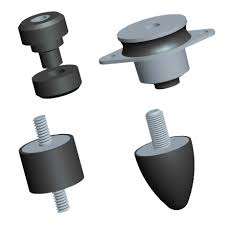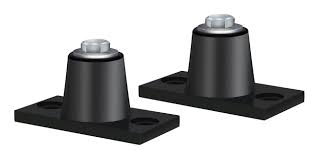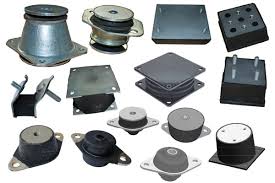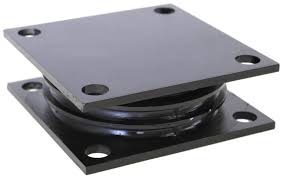Effectively Minimize Vibrations with Low Frequency Isolators
Low frequency vibration isolators are an essential component in various industries where the effective minimization of vibrations is crucial. These isolators are designed to reduce the transmission of low-frequency vibrations, providing a stable and controlled environment for delicate equipment and machinery. In this article, we will explore the importance of low frequency vibration isolators and how they can effectively minimize vibrations in a variety of applications.
Low frequency isolators are designed to minimize vibrations in machinery and equipment that operate at low frequencies. These isolators are typically made from materials that are effective at dampening vibrations and can be customized to specific frequency ranges. They are commonly used in applications such as industrial machinery, laboratory equipment, and sensitive instrumentation. By effectively minimizing vibrations, low frequency isolators can help improve the performance and longevity of equipment while reducing the risk of damage or malfunction.
Low frequency isolators are designed to minimize vibrations in machinery and equipment that operate at low frequencies. These isolators are typically made from materials that are effective at dampening vibrations and can be customized to specific frequency ranges. They are commonly used in applications such as industrial machinery, laboratory equipment, and sensitive instrumentation. By effectively minimizing vibrations, low frequency isolators can help improve the performance and longevity of equipment while reducing the risk of damage or malfunction. These isolators are crucial in maintaining the stability and accuracy of sensitive instruments and ensuring the smooth operation of machinery in various industries.
Understanding the Role of Low Frequency Vibration Isolators in Industrial Settings
types of vibration isolation

Low frequency vibration isolators play a crucial role in industrial settings by reducing the transmission of vibration and shock from machinery to the surrounding environment. These isolators are designed to effectively dampen low frequency vibrations, which can lead to structural damage, equipment malfunction, and worker discomfort if left uncontrolled. In manufacturing plants, laboratories, and other industrial facilities, low frequency vibration isolators are used to protect sensitive equipment, such as precision measuring instruments and electronic components, from the harmful effects of machinery-induced vibrations. By isolating these vibrations, the isolators help to maintain the accuracy and reliability of the equipment, ultimately contributing to the overall quality of production processes. Furthermore, in settings where human operators are present, such as assembly lines and control rooms, low frequency vibration isolators help to create a more comfortable and safer working environment by reducing the impact of machinery-induced vibrations on individuals. This can lead to improved worker productivity, comfort, and overall well-being. Overall, understanding the role of low frequency vibration isolators in industrial settings is essential for ensuring the optimal performance of equipment and the well-being of workers. By effectively controlling low frequency vibrations, these isolators contribute to the efficiency, reliability, and safety of various industrial operations.
The Importance of Low Frequency Vibration Isolators for Sensitive Equipment

Low frequency vibration isolators are crucial for protecting sensitive equipment from structural vibrations and other disturbances. These isolators are designed to minimize the transmission of low-frequency vibrations that can potentially damage or disrupt the operation of sensitive equipment such as laboratory instruments, measurement devices, and precision manufacturing machinery. By effectively isolating low-frequency vibrations, these specialized isolators help maintain the stability and accuracy of the equipment, ensuring consistent and reliable performance. Furthermore, they contribute to prolonging the lifespan of the equipment by reducing wear and tear caused by vibration-induced stress. Low frequency vibration isolators are commonly used in a wide range of industries, including aerospace, defense, medical, and industrial manufacturing, where precision and stability are essential for successful operations. In addition, they are often used in research and development environments, where the integrity of experimental data and measurements is critical. In summary, the importance of low frequency vibration isolators for sensitive equipment cannot be overstated. These isolators play a vital role in safeguarding the functionality and accuracy of sensitive equipment, ultimately contributing to improved operational efficiency and cost savings.
Choosing the Right Low Frequency Vibration Isolators for Your Application

When selecting low frequency vibration isolators for your application, it is important to consider the specific requirements of your equipment and the environment in which it will be operating. Factors to consider include the weight and size of the equipment, the level of vibration it will be subjected to, and any specific performance criteria that must be met. There are various types of low frequency vibration isolators available, including elastomeric mounts, air springs, and active isolation systems. Each type offers different levels of flexibility, damping, and isolation effectiveness. It is important to carefully evaluate each option and select the one that best meets the needs of your application. Additionally, it may be necessary to consider environmental factors such as temperature, exposure to chemicals or oils, and the presence of any potentially corrosive elements. This will help ensure that the chosen vibration isolators are durable and reliable in the long term. Overall, choosing the right low frequency vibration isolators for your application requires careful consideration of the specific requirements and operating conditions. By thoroughly evaluating the available options and understanding the unique needs of your equipment, you can select isolators that provide optimal performance and protection against harmful vibrations.
Improving Workplace Safety with Low Frequency Vibration Isolators

Improving workplace safety with low frequency vibration isolators involves implementing technology and equipment that can effectively dampen and absorb the vibrations produced by heavy machinery and equipment. These isolators are designed to reduce the risk of musculoskeletal injuries and fatigue caused by exposure to low frequency vibrations, which are often generated by industrial and construction machinery. By installing low frequency vibration isolators, employers can create a safer and more comfortable working environment for their employees, ultimately resulting in reduced injury rates and increased productivity.
How Low Frequency Vibration Isolators Can Extend the Lifespan of Machinery
Low frequency vibration isolators can extend the lifespan of machinery by reducing the impact of vibrations and shock on the equipment. These isolators are designed to absorb and dampen low frequency vibrations, preventing damage to the machinery and its components. By reducing the amount of vibration transmitted to the equipment, isolators can minimize wear and tear, increase the reliability of the machinery, and ultimately extend its operational lifespan. This can result in cost savings for companies by reducing the frequency of maintenance and repairs, as well as minimizing downtime due to equipment failure.
The Science Behind Low Frequency Vibration Isolators and Their Effectiveness
Low frequency vibration isolators are designed to reduce the transmission of vibration from a source to a sensitive target or system. These isolators are commonly used in various industrial and scientific applications where vibrations can negatively impact the performance of sensitive equipment or instruments. The effectiveness of low frequency vibration isolators lies in their ability to absorb and dissipate vibrational energy, preventing it from reaching the sensitive equipment. This is achieved through the use of specialized materials and designs that are capable of minimizing the transmission of low frequency vibrations. By effectively isolating low frequency vibrations, these isolators help maintain the stability and accuracy of sensitive equipment, such as precision instruments, optical devices, and electronic components. This can result in improved performance, increased lifespan, and reduced maintenance requirements for the protected equipment or systems. Overall, the science behind low frequency vibration isolators and their effectiveness lies in their ability to mitigate the impact of vibrations on sensitive equipment, ultimately contributing to enhanced performance and reliability in various industrial and scientific environments.
Comparing Different Types of Low Frequency Vibration Isolators for Various Uses
Low frequency vibration isolators are designed to absorb and reduce low frequency vibrations in various applications. There are several types of low frequency vibration isolators available, including elastomeric mounts, air springs, and passive isolators. Elastomeric mounts are made of rubber or similar materials and provide isolation by compressing and absorbing the vibrations. They are commonly used in industrial machinery, automotive applications, and HVAC systems. Air springs use pressurized air to isolate vibrations and are often used in heavy duty machinery, such as construction equipment and transportation vehicles. Passive isolators, such as mechanical springs and dampers, provide isolation through the use of mechanical components and are commonly used in precision equipment, such as laboratory instruments and optical devices. When choosing a low frequency vibration isolator, it is important to consider the specific requirements of the application, such as load capacity, environmental conditions, and level of isolation needed. Additionally, it is important to consider the maintenance and long-term performance of the isolator in the intended application.
Maximizing Performance and Minimizing Disruption with Low Frequency Vibration Isolators<
types of vibration isolation/h2>
Low frequency vibration isolators are designed to minimize the disruption caused by machinery and equipment in various industries. By effectively isolating low frequency vibrations, these isolators help maximize the performance of sensitive equipment and reduce the risk of damage or malfunction. These isolators work by absorbing and dissipating the energy created by low frequency vibrations, preventing it from being transferred to surrounding structures and equipment. This not only helps to protect the machinery itself, but also minimizes the impact on nearby personnel and reduces the potential for noise pollution in the workplace. By utilizing low frequency vibration isolators, industries can optimize the performance and lifespan of their equipment, while also creating a safer and more comfortable working environment. Whether it's in manufacturing, research labs, or other industrial settings, these isolators play a crucial role in maintaining operational efficiency and reducing the potential for costly downtime and repairs.
In conclusion, it is clear that low frequency vibration isolators play a crucial role in effectively minimizing vibrations in various equipment and machinery. By using these isolators, businesses and industries can protect their sensitive equipment and ensure smooth operations. Additionally, the use of low frequency isolators can contribute to a safer and more comfortable work environment for employees. It is evident that investing in low frequency vibration isolators is a smart decision for any company looking to maintain a high level of performance and efficiency.
See also
https://www.isotechinc.com/vibration-isolators/ https://www.kineticsnoise.com/seismic/